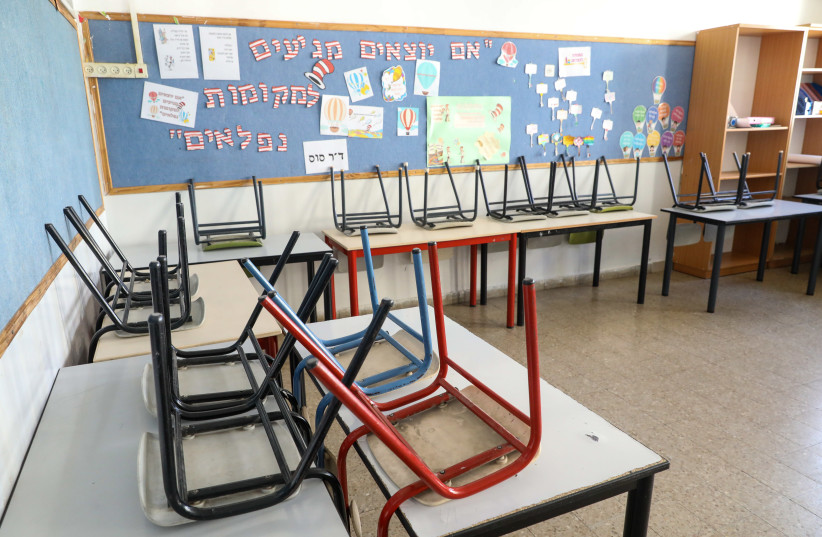Haredi org. calls for funding for schools that teach core curriculum!
The large majority of elementary school aged ultra-Orthodox boys study almost no core curriculum subjects, such as math, English, science or computer studies.

An organization representing modern ultra-Orthodox families
has called on the government to include significant funds for the
network of schools known as the State Ultra-Orthodox system in order to
boost its viability and increase the number of ultra-Orthodox boys
studying the core curriculum.
The
New Haredim organization which is now lobbying for these funds says
that several tens of millions of shekels are needed for state
ultra-Orthodox schools in order to make them financially viable and make
them a real option for haredi parents who want to give their sons a
general education, and allow them in the future to obtain higher
education qualifications.
“The
Israeli government and philanthropic groups have invested billions into
getting haredim into academia and the workforce but the educational gap
for those who have not learned general education subjects at school is
too large to overcome,” said Pnina Pfeuffer, head of New Haredim.
She said that it was critical to get the funds allocated for such schools as part of the core state budget since when the budget is passed by the Knesset, it creates a legal obligation on the state to disburse such funds.
“It
is a national issue for everyone that haredi boys have an education,”
she said, noting that every year thousands of ultra-Orthodox boys fail
to acquire a basic education which would prepare them for the workforce,
while the community continues to grow rapidly.
Pfeuffer
argues that it is preferable to provide a framework where haredi
parents who are interested in such schools can freely chose them, as
opposed to a confrontational strategy of cutting funds to existing
ultra-Orthodox schools which would create conflict with the community’s
political and rabbinic leadership.
The
large majority of elementary school aged ultra-Orthodox boys study
almost no core curriculum subjects, such as math, English, science or
computer studies, along with the overwhelming majority of ultra-Orthodox
male high-school pupils.
This
creates severe difficulties for ultra-Orthodox men who seek to obtain
higher education qualifications and ultimately enter the workforce,
especially in obtaining higher paying jobs.
Although
there has been a significant increase in the number of ultra-Orthodox
men and women beginning higher education qualifications in universities
and colleges, almost one in every two ultra-Orthodox men who start such
courses complete them, a state comptroller’s report found in 2019.
The
same report determined that one of the primary reasons for the high
drop out rate was due to the lack of basic education ultra-Orthodox boys
receive when they are of school age.
But
a growing number of so-called “modern ultra-Orthodox” families have
sought to ensure their boys receive education in core curriculum
subjects to prepare them for employment in the future.
During
the 2013 - 2015 government, then education minister Shai Piron of Yesh
Atid established the State Haredi School network, as a system of schools
for ultra-Orthodox boys which alongside religious studies would also
teach the core curriculum.
But
the new network was never established through legislation or even
administrative orders from the Education Ministry, creating significant
difficulties in establishing and funding such schools, says Pnina
Pfeuffer, head of the New Haredim organization.
In
addition, local municipal authorities must give their authorization for
such schools to be opened due to their lack of national and legislative
standing.
This
has meant that such schools have not been opened in ultra-Orthodox
stronghold cities such as Bnei Brak because the rabbinic and political
leadership of the community is opposed to such schools.
This is in part on ideological grounds, in which the rabbinic leadership believes that teaching non-religious studies
Because
state haredi schools are not grounded in legislation, it means that a
group of families interested in such a school have to request one be
establishment and cannot rely on the education ministry to set one up
for them.
Sometimes,
if there are only a small number of requesting families it means that
creating such a school is not financially viable, another problem which
would be rectified by legislation, says Pfeuffer.
And
because of the rabbinic opposition to such schools, there is also often
social pressure against parents seeking to establish them.
For
these reasons, the network has not been able to flourish and state
haredi schools comprise just 4% of all ultra-Orthodox schools.
Legislation establishing the network in law would give it greater resources and greater ability to expand, Pfeuffer said.


It's bad enough that the article spells out Mrs. P.'s first name; next thing you know, they will be publishing her picture.
ReplyDelete